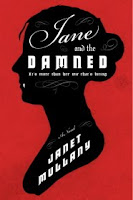Inspired by discussion on various loops and at History Hoydens…
The London residence of the Duke of S– was raided by the Regency Police and a large number of items, including a quantity of white powder in the kitchen, was seized. The Duke is subject to various offenses covered by the Regency Anachronism Act.
Sirs,
I wish to complain about the recent Regency Police raid on my property. My household is in an uproar and I have scarcely been able to escape to my usual dens of vice for entertainment. I wish to know the whereabouts of various items of clothing and, frankly, since the baking powder and whiskey were seized, breakfasts have been hell.
My mistress skulks around the house, furious that her red silk nightgown and her gown with the tiny buttons down the back, both of which we enjoyed immensely, have been taken. I am immensely distressed that, barring extraordinary circumstances and an appeal to the courts, I cannot propose marriage to her, which I wish to do following more mutual psychological torture to prove that I am indeed worthy of her.
My housemaid, who has lost the prestige of opening the front door wearing a black silk gown and white cap, skulks downstairs in her shift. Furthermore, my formerly doddering butler, who had forty years lopped off his age, seems more interested in exploring the fleshpots of London than attending to household duties.
On the other hand I must commend the police for removing all of my skintight breeches which means that for the first time in years I can sit when clothed, and do not split them every time I ride. You need not return these, or the implement (the “can opener”) which was necessary to their removal. My thanks also for reminding me that there is a war on, and I believe I have some younger brothers involved therein; also for the reminder that if they return pathetically scarred in mind and body, my fraternal advice will be to get over it.
The business of the shirts, however, is problematic. Since they all opened the wrong way, to my astonishment, and naturally I own no nightshirts, I am to all intents completely unclothed in my house. Despite assurance that I am now properly heroic, I find the continual attentions of my mistress exhausting. Following your advice, I am applying lemon juice daily to remove the tan and allowing my chest hair to grow back.
I remain, sirs, your most obdt. servt.,
Slut
What else did the Regency Police seize?
A Damned Good Contest continues; enter to win Jane and the Damned stuff!









